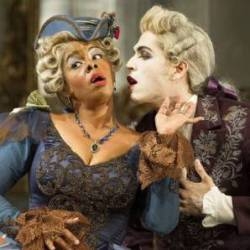La finta giardiniera (Glyndebourne)
A charming early opera by Mozart makes its first appearance at Glyndebourne

© Alastair Muir
The libretto is very loosely based on Carlo Goldoni’s adaptation of Samuel Richardson’s epistolary novel Pamela. Mozart’s opera keeps Goldoni’s neat, convenient conclusion of having Pamela turn out to be a lady rather than a maid but the three versions, otherwise, have little in common except the central conceit of a servant girl loved by her master.
In his Glyndebourne debut, Frederic Wake-Walker shows considerable flair with a meta-theatrical approach that exposes the workings of the process at every turn, from the ostentatiously visible arms of an unseen stagehand reeling in the tabs on the false proscenium to a major slice of deconstruction later in the evening.
Taking the word "finta" in the work’s title ('The fake gardener') as his keynote, Wake-Walker is less concerned with plot and more with ideas, as he relentlessly plays with the themes of disguise, deceit and illusion. An arguably underdeveloped idea is the Rococo façade dropping in great clumps as masks slip and true natures begin to emerge.
An added layer of alienation on the first night came from having the servant Nardo mimed by an ailing Gyula Orendt and voiced by Gavan Ring from just inside the auditorium.
Just as the sea seems to be banished from productions of Peter Grimes so often these days, nature is kept at bay here and Sandrina’s assumed trade as gardener is hardly apparent, with not a flower or watering can to be seen. The Act 2 woodland scene is played out within the house until a bucolic setting is only finally revealed in the form of a backdrop, destined to slither to the floor as another layer of theatrical artifice.
"the lightness of a bug skimming on water"
Wake-Walker introduces an extra dimension of reality to the fantastical plot by having Sandrina’s slightly bizarre back story – a stabbing and being left for dead by the immaturely jealous Belfiore – acted out during the overture. We then see her as a deeply traumatised victim of violence whose recovery comes in gradual steps, including a period of hallucinatory madness.
Robin Ticciati handles the Orchestra of the Age of Enlightenment with the lightness of a bug skimming on water and the singing is simply glorious. The seven principals (no chorus) are led by Christiane Karg‘s crystalline Sandrina, with superb support from Joélle Harvey (Serpetta), Nicole Heaston (Arminda) and Rachel Frenkel in the trouser role of Ramiro. Wolfgang Ablinger-Sperrhacke seems oddly cast as Don Anchise but gives it his usual characterful ebullience and there’s fine singing from Joel Prieto as Belfiore. Orendt was up to delivering the recitatives expressively while Ring impressed in his stand-in role singing the arias.
Frequent operagoers may find Wake-Walker’s techniques over-familiar, and he certainly overdoes the ironic pseudo-Baroque posturing, but he provides a stimulating evening of a work that could easily bore if borne too lightly.












